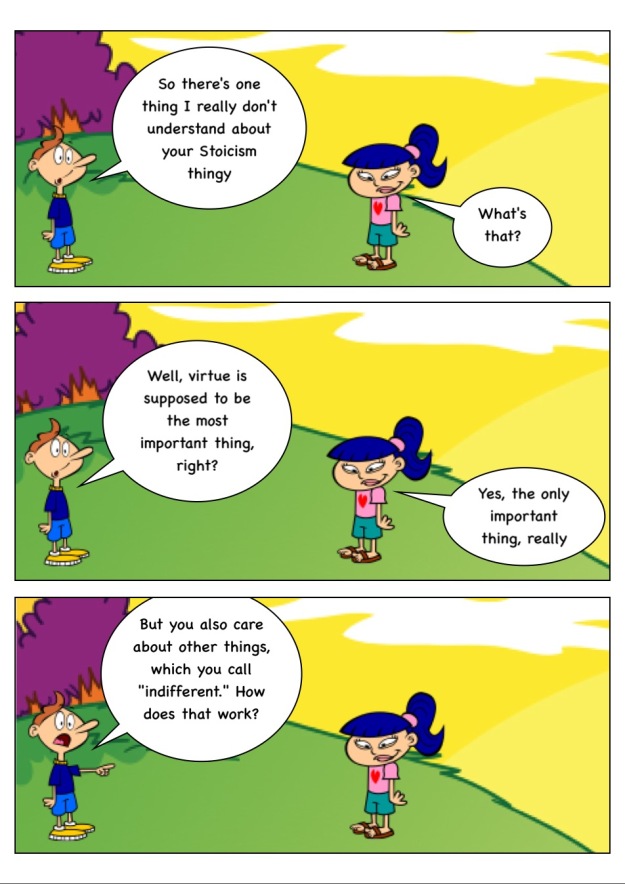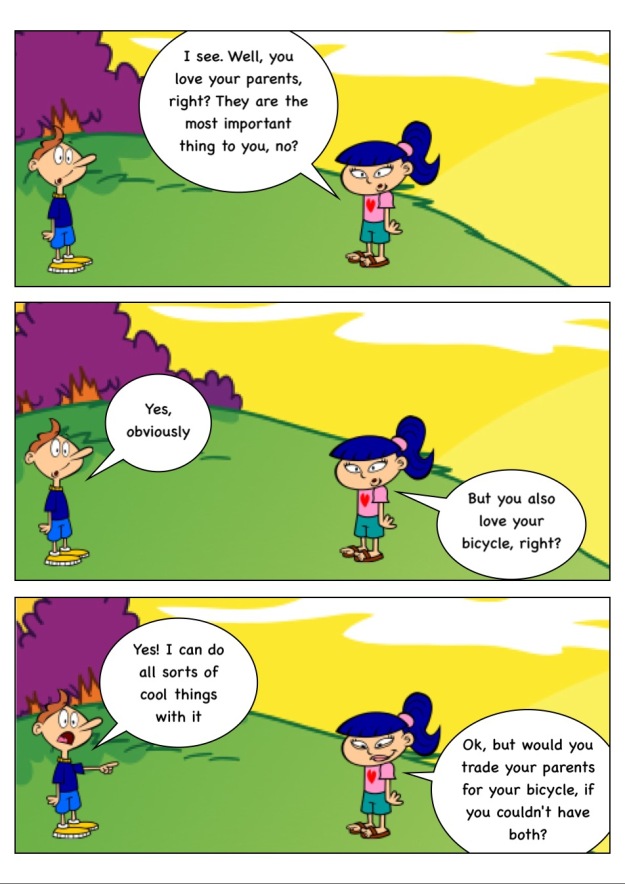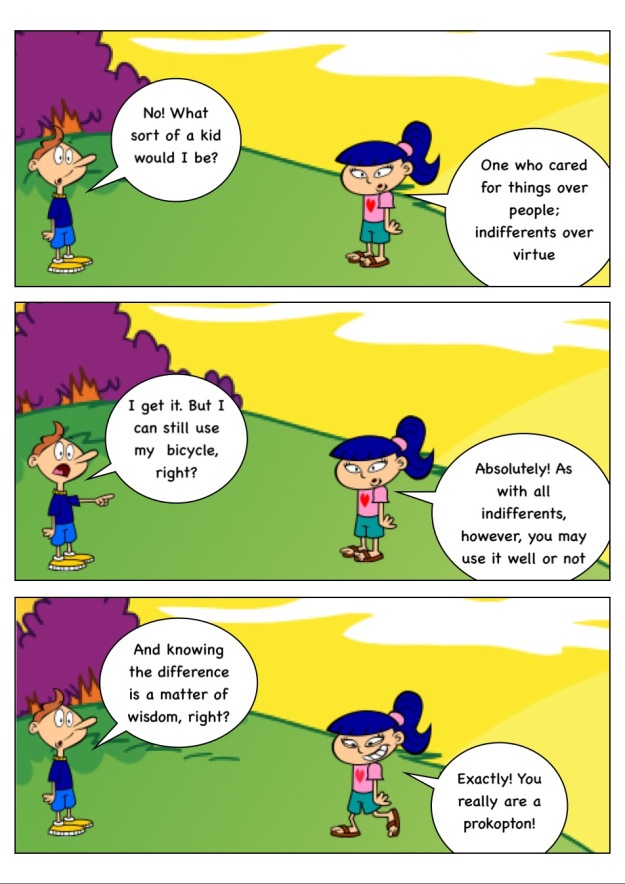 I rarely write for children, I’m just not that good at it. (I did publish one book on evolutionary biology for young teenagers, in Italian, but it was back in 1987…) And yet, writing science, and especially philosophy, for kids is crucial if we care about the future of both science and philosophy (and of our kids).
I rarely write for children, I’m just not that good at it. (I did publish one book on evolutionary biology for young teenagers, in Italian, but it was back in 1987…) And yet, writing science, and especially philosophy, for kids is crucial if we care about the future of both science and philosophy (and of our kids).
That’s why I’m working on a new book project on Stoicism for children, together with a friend of mine who is a good graphic artist as well as a motivated Stoic, having just become a father. But this post isn’t about that, though stay tuned for more as soon as Kevin and I feel that we have a decent preview to submit to the world.
Meanwhile, I’m going to start an occasional series entitled “Stoicism for kids,” featuring short dialogues between a young boy (let’s call him Lucilio) and a young girl (whose name is Seneca, and I dont’ care if the latter was a male name in Ancient Rome). The girl is a more advanced prokopton than the boy, but the latter is curious and inquisitive.
I’m not only not good at writing for kids, I’m also a disaster at drawing. But I love the idea of making comics. Which is why I enlisted the help of a dedicated app for comics-making, the aptly named Comic Maker. With apologies for the crudeness of the result, here is my first strip:




Hypatia ? Pre-stoic I guess.
LikeLike
You should look into cartons like Gumball or
LikeLike
Hi Massimo: The cartoon is much to abstract for kids.
LikeLike
It’s cute the way it uses simple relationships yet doesn’t insult a child’s intelligence.
And the feminine of prokoptōn is prokoptousa.
LikeLiked by 1 person
Picture Girl talking to boy:
Girl: Do you love your bike?
Boy: Yeah, it’s fun
Picture Boy Whizzing down a hill with big smile
Girl: What if you crashed and ruined it?
Boy: But I’m ok?
Girl: Yes, you’re ok, just a scraped knee
Picture Boy with crumpled bike and scarped knee, looking sad.
Boy: I’d be sad. I loved that bike
Girl: What if you mother died?
Boy: Oh No! What happened to her?
Girl: She was run over by a horse…
Boy: Starts to cry
Pictured
Girl: Why are you crying?
Boy: My mother died…
Girl: How about your bike?
Boy: Well I could get a new bike…
Girl: How about a new mother?
Boy: NO!
Girl: What would you do?
Boy: Cry
Girl: And?
Boy: Help my Dad with my baby sisters
Girl; You are a Stoic!
Boy: Huh?
LikeLike
In so many ways I agree that teaching children about Stoic techniques is a good idea, particularly to develop their coping skills and sense of wellbeing. Developing their moral character through the cultivation of virtue is also of vital importance if we hope to raise them to be responsible adults worthy of leadership and skilful at managing life’s many challenges. My only concern would be the language – is it a good idea to present it to children in its authentic form by using Stoic terms such as prokopton? Could this individualise them and separate them from those around them and make them believe they are ‘different’ or ‘special’? I’m probably thinking of Nietzsche here and worrying they may feel under pressure to be superhuman. Perhaps in context the language in your book may be fine and illustrations are a great idea. I do remember when Jules Evans did his work for schools he kept the language user friendly and drew on humour to grab attention. I still smile today when I remember his use of ‘musturbating’ to describe how a perfectionist may pile too much pressure on themselves in the hope of controlling someone’s opinion of their work – classic! I really do hope you and Kevin reach some children with your book – philosophy is a gift which all children should be able to open.
Thanks Massimo for all the wonderful articles on this site. Alison
LikeLiked by 1 person
Aweavermc,
Thanks for the kind words. I thought hard about using the word “prokopton” in the last panel, precisely for the reasons you mention. In the end I decided that we do a disservice to kids not to challenge them a bit. One of the pleasures of learning is to acquire new words, which open up new meanings and new vistas.
That said, in the book with Kevin we’ll probably either avoid or minimize this, if nothing else because an editor wouldn’t stand for it!
LikeLiked by 1 person
Nice project to share!, engaging kids in stoicism is a great idea for our current society.
LikeLike
Launch a Stoic app for children called “Prokopton Go” and you’ll definitely grab their attention!
LikeLiked by 2 people
The world of Pokémon bears a strong resemblance to the Roman culture of gladiator’s with trainers and stables. Closer I think than Sumo. Apparently not all gladiators were slaves and the life expectancy was not too much lower than the general population (well I read that someplace, but I’m not sure how reliable it is.).
Anyway ‘ProkoptonMon Go’ might not be such a bad idea.
–>A rip-off of Monty Python;s ‘universe song’ but rated G…
LikeLiked by 1 person
Synred,
Hypatia was actually post-Stoic, post-Hellenistic.
Yes, the cartoon may be too abstract for kids — though again I do wonder about underestimating kids’ abilities, especially in American society. I did say I’m not good at writing at that level, hopefully my future attempts will be improvements, and Kevin will help me come out with a successful book.
Thanks for the links and suggestions, by the way.
As for gladiators, it is true that in later times (post-Republic) they were not necessarily slaves, and that some people made a successful career of it, even becoming stars of the circus, well paid and acclaimed by the crowds. I’m not positive about the life expectancy part, but remember that life expectancy was low in the general population anyway.
LikeLike
Yeah, I don’t think you should dumb it down (much), but it needs to be more lively than two kids talking to catch kids interest (esp. these days).
My granddaughter as always loved big words and could pronounce them clearly when she was three, though didn’t always know what they meant of course.
In preschool she came up behind her teacher who was talking to a parent and said “developmental inappropriate” with such perfect pronunciation that the teacher looked around for an adult. A few weeks later she was telling her cat it was “inappropriate” when he got up on the kitchen counter. The cat was not impressed.
Anyway, I’ll introduce her to a couple of these words. I think she’ll like them though I’ll have to find out how to pronounce them myself.
Lot’s of kids cartoon’s these days seem to have pretty sophisticated content (along with being annoyingly noisy). The computer generated animation is pretty awful. Maybe Rocky and Bullwinkle’s AESOPs fables would be a suitable model or is Mr. Peabody a Stoic?
LikeLike
Synred,
I should have clarified that these cartoons are just my modest way to play around with the idea of Stoicism for kids, in the hope maybe to inspire parents and teachers. The book with Kevin will have a very different structure, most likely of a story with a main character or two and actual adventures happening.
Also, the app I’m using for these — which I produce in my spare time (what’s that?!) is limited, in terms of scenes and characters, and I don’t have the skills or time to produce animated stuff. But, again, maybe someone will be inspired…
LikeLiked by 1 person
Yeah, I think the point of whatever I was reading was that Gladiators had life expectancy comparable to ‘general public’, but lived better in the meanwhile.
Unfortunately, I forget where this was. It may have been something about the origin of Pokémon.
LikeLike
I have dreamed of writing about Stoicism for kids (say aged 5-8). Unfortunately, I don’t know how to write for that age group, so I’m really happy you are giving it a go.
I have communications background. Whenever I plan to do some persuasive writing, there are a few questions I must always answer for myself before I even write the first word:
1) How would you characterize your target audience? What is is likely to get its attention? How can you can you motivate it to continue reading? What language does it speak?
Writing for 5-8 years olds is different than writing for 9-12 year olds or teens. How will your target audience react to words like ‘prokoton’ and ‘virtue’? I think that it’s important you use language it can understand, especially when you want it to focus on a difficult concept.
2) What is your communications objective? To persuade the audience to accept the Stoic lifestyle immediately? To prepare it with a few basic concepts so it is ready for the whole thing when it gets older? To show it is a ‘cool’ alternative to organized religion? To learn the language of Stoicism?
Communicating with kids is challenging at the best of times. Objectives need to be achievable, precise and kept to a minimum. Challenging this audience with concepts, using familiar language, is probably enough to start with. Challenging then with new vocabulary can come later.
LikeLiked by 1 person
Thanks Andrew, Kevin and I will keep all that in mind while developing our book!
LikeLike
https://aeon.co/essays/dewey-knew-how-to-teach-democracy-and-we-must-not-forget-it?utm_source=Aeon+Newsletter &utm_campaign=76d4e9299a-Daily_Newsletter_28_July_20167_26_2016&utm_medium=email&utm_term=0_411a82e59d-76d4e9299a-69000965
Dewey?
For yourself:
“John Lachs, one of American philosophy’s most distinguished interpreters, turns to William James, Josiah Royce, Charles S. Peirce, John Dewey, and George Santayana to elaborate stoic pragmatism, or a way to live life within reasonable limit
LikeLike
Sad, that I can only click ‘Like’ once ….
LikeLiked by 1 person
I may be too late to the party here but…
I love the idea of Stoicism for Kids! I’m training to be a School Psychologist and lament the lack of Stoic materials I can use with my clients, usually having to adapt CBT and DBT stuff for the most part. REBT has a book for kids, but the execution is way too abstract and moralistic. The problem is that the story and characters have to be relatable. If it’s too obviously a philosophical conversation/moral tale with cartoon faces, it’s not very compelling. There needs to be tension, surprise, and all the other dramatic elements we love in fiction.
On that, I agree with some of the other comments here that this could be a little on the abstract side. I’ve tried writing for kids too, and it’s harder than it looks. If I could be so bold as to recommend anything, I’d advise taking a page from My Little Ponies: Friendship is Magic, not only because it has broad audience appeal (Bronies love it too!), but also because it has potential to be used for this exercise.
If you’re not familiar with the series: the main characters all represent different personality archetypes that, as a prokopton wannabe myself, I like to think of as embodiments of certain virtues. This isn’t just me over-reading into the concept. Check out: http://mlp.wikia.com/wiki/Elements_of_Harmony for some Bronie science.
The main alteration I make while watching is seeing Twilight Sparkle, the main character, not as “magic” but as “wisdom” as her decision-making and drive towards virtue is the real glue that holds the group together.
So – why not steal from the greats? What if you had characters assigned to the four Stoic virtues learning to embody them through adventures? I’d highly recommend checking out some MLP episodes in any case as great examples of the genre (though be patient with the songwriting – it gets better after a few seasons).
(Also – this idea of combining Stoicism meets MLP into a book has been rumbling around in my head for a while. I was hoping to get better immersed and versed in Stoicism before I got started on it myself. Mostly I’m interested in seeing it exist in the real world, so if it strikes your fancy take it and run!) 🙂
LikeLiked by 1 person
Dustin,
Thanks for the comments and suggestions! Again, this was just a fun thing to do while relaxing, but the project with Kevin will be more seriously thought out, and hopefully incorporating some of the suggestions I’m getting here!
LikeLike
Stoicism for Kids?
LikeLike
Hi all,
I’m VERY keen on promoting the idea of Stoicism for kids. I’m a teacher in Scotland and I’m currently putting together a very rough outline using the Stoic ‘toolkit’ approach for my school. I’m not sure it will be accepted, or even whether I’ll get support to pursue it further, but I’ve taught elementary for twenty years and would be honoured to help in any way I can.
Yours,
Robert
LikeLike
Robert, I’d be very curious to know how your Stoic toolkit fares, please come back and comment further whenever you have more.
LikeLike